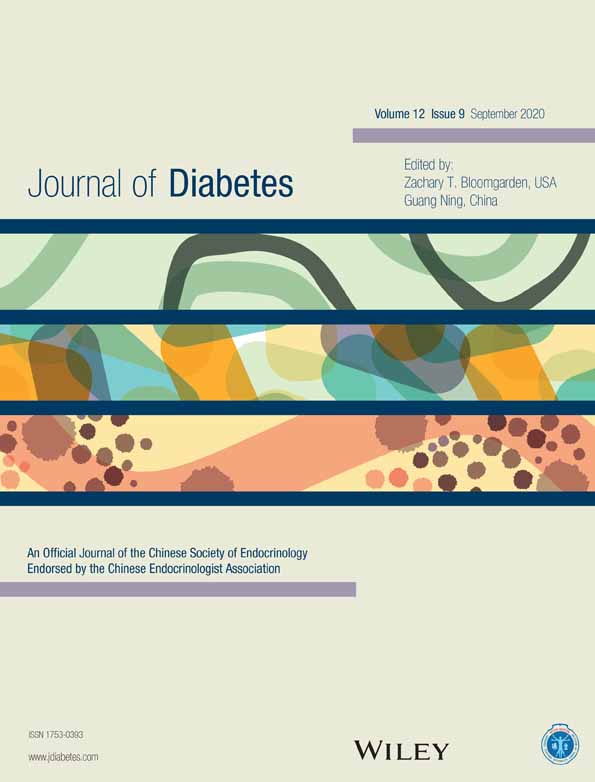LETTER TO THE EDITOR
Comment on “Is the type of diabetes treatment relevant to outcome of COVID-19?”
Rimesh Pal,
Mainak Banerjee,
Corresponding Author
Rimesh Pal
Department of Endocrinology, Post Graduate Institute of Medical Education and Research, Chandigarh, India
Search for more papers by this authorMainak Banerjee
Department of Endocrinology, Institute of Post Graduate Medical Education and Research, Kolkata, India
Search for more papers by this authorRimesh Pal,
Mainak Banerjee,
Corresponding Author
Rimesh Pal
Department of Endocrinology, Post Graduate Institute of Medical Education and Research, Chandigarh, India
Search for more papers by this authorMainak Banerjee
Department of Endocrinology, Institute of Post Graduate Medical Education and Research, Kolkata, India
Search for more papers by this authorNo abstract is available for this article.
REFERENCES
- 1Bloomgarden Z. Is the type of diabetes treatment relevant to outcome of COVID -19? J Diabetes. 2020; https://doi.org/10.1111/1753-0407.13047.
- 2Erdmann E, Dormandy JA, Charbonnel B, Massi-Benedetti M, Moules IK, Skene AM. The effect of pioglitazone on recurrent myocardial infarction in 2,445 patients with type 2 diabetes and previous myocardial infarction. J Am Coll Cardiol. 2007; 49: 1772-1780. https://doi.org/10.1016/j.jacc.2006.12.048.
- 3Wilcox R, Bousser M-G, Betteridge DJ, et al. Effects of pioglitazone in patients with type 2 diabetes with or without previous stroke: results from PROactive (PROspective pioglitAzone clinical trial in macroVascular events 04). Stroke. 2007; 38: 865-873. https://doi.org/10.1161/01.STR.0000257974.06317.49.
- 4Erdmann E, Charbonnel B, Wilcox RG, et al. Pioglitazone use and heart failure in patients with type 2 diabetes and preexisting cardiovascular disease: data from the PROactive study (PROactive 08). Diabetes Care. 2007; 30: 2773-2778. https://doi.org/10.2337/dc07-0717.
- 5Shah M, Kolandaivelu A, Fearon WF. Pioglitazone-induced heart failure despite normal left ventricular function. Am J Med. 2004; 117: 973-974. https://doi.org/10.1016/j.amjmed.2004.10.010.
- 6Jearath V, Vashisht R, Rustagi V, Raina S, Sharma R. Pioglitazone-induced congestive heart failure and pulmonary edema in a patient with preserved ejection fraction. J Pharmacol Pharmacother. 2016; 7: 41-43. https://doi.org/10.4103/0976-500X.179363.
- 7Singh S, Loke YK, Furberg CD. Thiazolidinediones and heart failure: a teleo-analysis. Diabetes Care. 2007; 30: 2148-2153. https://doi.org/10.2337/dc07-0141.
- 8Zhou F, Yu T, Du R, et al. Clinical course and risk factors for mortality of adult inpatients with COVID-19 in Wuhan, China: a retrospective cohort study. Lancet. 2020; 395: 1054-1062. https://doi.org/10.1016/S0140-6736(20.
- 9Mehra MR, Ruschitzka F. COVID-19 illness and heart failure. JACC Heart Fail. 2020; 8: 512-514. https://doi.org/10.1016/j.jchf.2020.03.004.
- 10Inciardi RM, Lupi L, Zaccone G, et al. Cardiac involvement in a patient with coronavirus disease 2019 (COVID-19). JAMA Cardiol. 2020. https://doi.org/10.1001/jamacardio.2020.1096.
- 11Sambanis C, Tziomalos K, Kountana E, et al. Effect of pioglitazone on heart function and N-terminal pro-brain natriuretic peptide levels of patients with type 2 diabetes. Acta Diabetol. 2008; 45: 23-30. https://doi.org/10.1007/s00592-007-0014-7.
- 12Fang L, Karakiulakis G, Roth M. Are patients with hypertension and diabetes mellitus at increased risk for COVID-19 infection? Lancet Respir Med. 2020; 8:e21. https://doi.org/10.1016/S2213-2600(20)30116-8.
- 13Tripathy D, Daniele G, Fiorentino TV, et al. Pioglitazone improves glucose metabolism and modulates skeletal muscle TIMP-3–TACE dyad in type 2 diabetes mellitus: a randomised, double-blind, placebo-controlled, mechanistic study. Diabetologia. 2013; 56: 2153-2163. https://doi.org/10.1007/s00125-013-2976-z.
- 14Pal R, Bhadada SK. Should anti-diabetic medications be reconsidered amid COVID-19 pandemic? Diabetes Res Clin Pract. 2020; 163:108146. https://doi.org/10.1016/j.diabres.2020.108146.
- 15Zha L, Li S, Pan L, et al. Corticosteroid treatment of patients with coronavirus disease 2019 (COVID-19). Med J Aust. 2020; 212: 416-420. https://doi.org/10.5694/mja2.50577.
- 16Rosenberg ES, Dufort EM, Udo T, et al. Association of treatment with hydroxychloroquine or azithromycin with in-hospital mortality in patients with COVID-19 in New York state. JAMA. 2020; https://doi.org/10.1001/jama.2020.8630.
- 17Geleris J, Sun Y, Platt J, et al. Observational study of hydroxychloroquine in hospitalized patients with COVID-19. N Engl J Med. 2020; https://doi.org/10.1056/NEJMoa2012410.
- 18Bessière F, Roccia H, Delinière A, et al. Assessment of QT intervals in a case series of patients with coronavirus disease 2019 (COVID-19) infection treated with hydroxychloroquine alone or in combination with azithromycin in an intensive care unit. JAMA Cardiol. 2020; https://doi.org/10.1001/jamacardio.2020.1787.
- 19Mercuro NJ, Yen CF, Shim DJ, et al. Risk of QT interval prolongation associated with use of hydroxychloroquine with or without concomitant azithromycin among hospitalized patients testing positive for coronavirus disease 2019 (COVID-19). JAMA Cardiol. 2020; https://doi.org/10.1001/jamacardio.2020.1834.
- 20Borba MGS, Val FFA, Sampaio VS, et al. Effect of high vs low doses of chloroquine diphosphate as adjunctive therapy for patients hospitalized with severe acute respiratory syndrome coronavirus 2 (SARS-CoV-2) infection: a randomized clinical trial. JAMA Netw Open. 2020; 3:e208857. https://doi.org/10.1001/jamanetworkopen.2020.8857.
- 21Pareek A, Chandurkar N, Thomas N, et al. Efficacy and safety of hydroxychloroquine in the treatment of type 2 diabetes mellitus: a double blind, randomized comparison with pioglitazone. Curr Med Res Opin. 2014; 30: 1257-1266. https://doi.org/10.1185/03007995.2014.909393.
- 22Gerstein HC, Thorpe KE, Wayne Taylor D, Brian Haynes R. The effectiveness of hydroxychloroquine in patients with type 2 diabetes mellitus who are refractory to sulfonylureas—a randomized trial. Diabetes Res Clin Pract. 2002; 55: 209-219. https://doi.org/10.1016/S0168-8227(01)00325-4.
- 23Bonnet F, Scheen AJ. Effects of SGLT2 inhibitors on systemic and tissue low-grade inflammation: the potential contribution to diabetes complications and cardiovascular disease. Diabetes Metab. 2018; 44: 457-464. https://doi.org/10.1016/j.diabet.2018.09.005.
- 24Iannantuoni F, de Marañon M, Diaz-Morales N, et al. The SGLT2 inhibitor Empagliflozin ameliorates the inflammatory profile in type 2 diabetic patients and promotes an antioxidant response in leukocytes. J Clin Med. 2019; 8: 1814. https://doi.org/10.3390/jcm8111814.
- 25Heerspink HJL, Perco P, Mulder S, et al. Canagliflozin reduces inflammation and fibrosis biomarkers: a potential mechanism of action for beneficial effects of SGLT2 inhibitors in diabetic kidney disease. Diabetologia. 2019; 62: 1154-1166. https://doi.org/10.1007/s00125-019-4859-4.
- 26Bornstein SR, Rubino F, Khunti K, et al. Practical recommendations for the management of diabetes in patients with COVID-19. Lancet Diabetes Endocrinol. 2020; 8: 546-550. https://doi.org/10.1016/S2213-8587(20)30152-2.
- 27Pal R, Bhadada SK. Reply to comment on “should anti-diabetic medications be reconsidered amid COVID-19 pandemic?”. Diabetes Res Clin Pract. 2020;108192 https://doi.org/10.1016/j.diabres.2020.108192.




